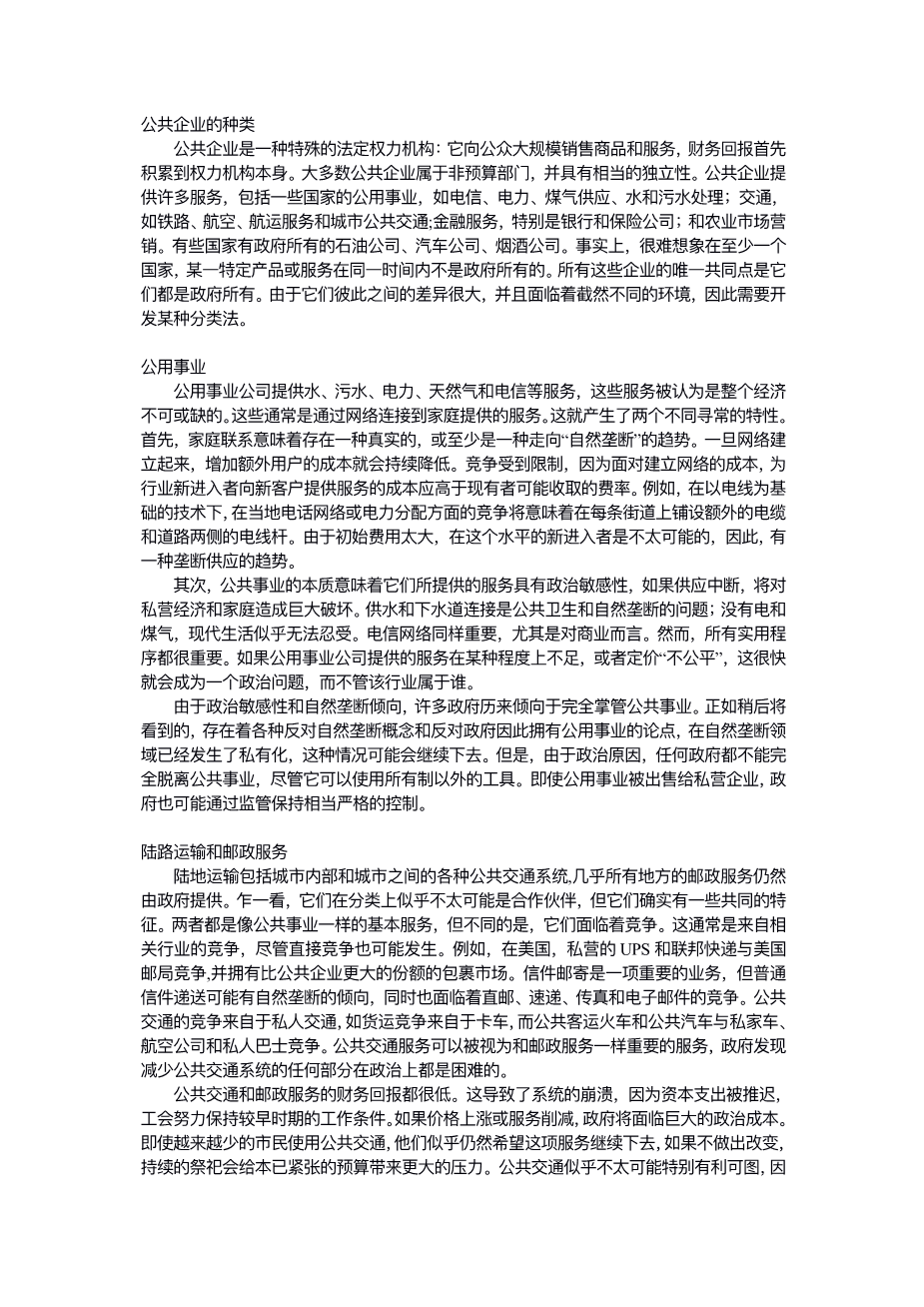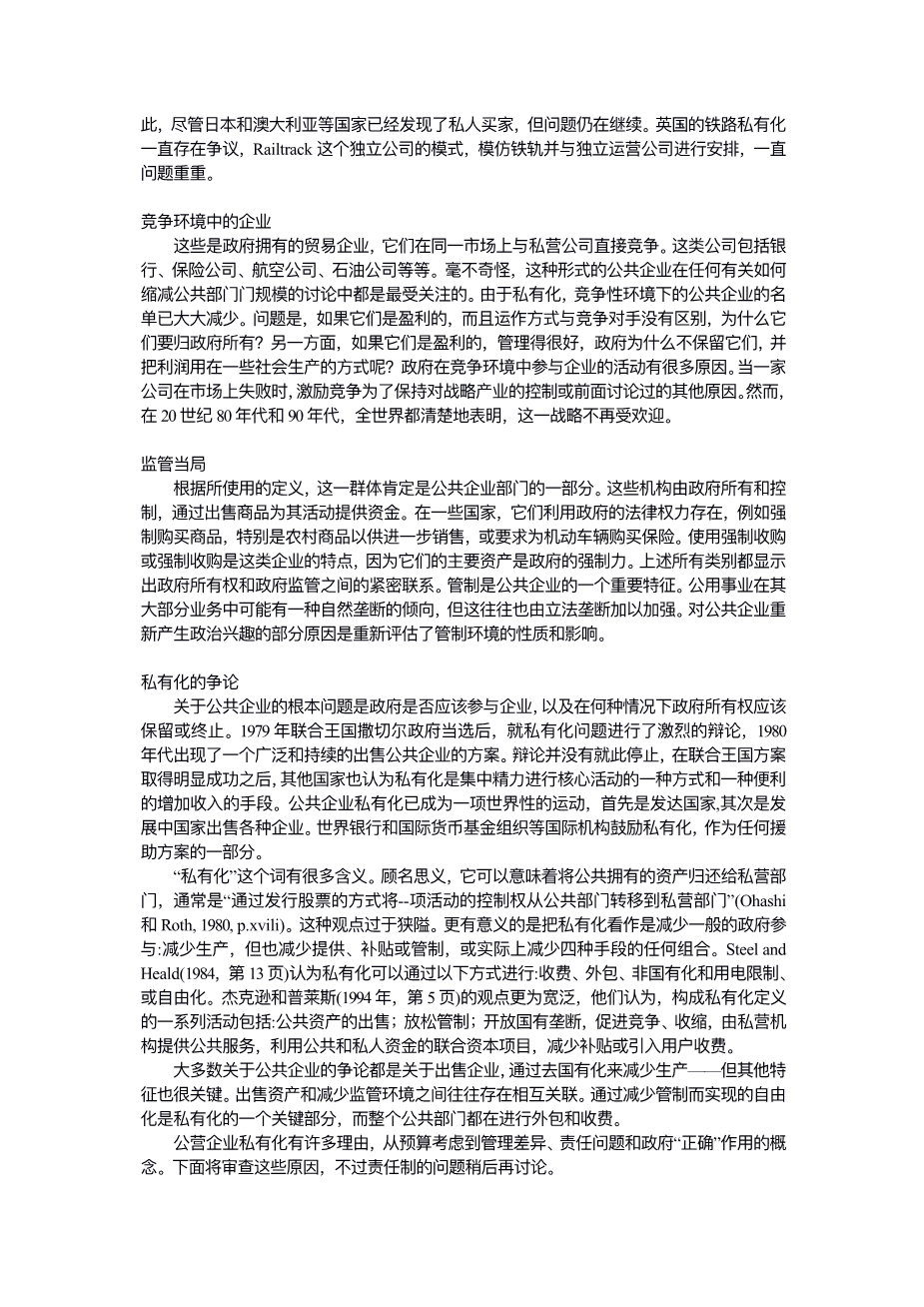Kinds of public enterprise
A public enterprise is a particular kind of statutory authority: one that sells goods and services to the public on a large scale, with the financial returns accruing in the first instance to the authority itself. Most public enterprises are in the non-budget sector, and operate with substantial independence. Public enterprises provide many services including, in some countries, utilities such as telecommunications, electricity, gas supplies, water and sewerage; transport, such as rail, airlines, shipping services and urban public transport; financial services, notably banks and insurance companies; and agricultural marketing. Some countries have government-owned oil companies, motor vehicle companies, tobacco and alcohol companies. Indeed, it is hard to imagine a particular product or service that has not been government-owned in at least one country at one time. The only point in common of all these is their government ownership. As they differ widely from each other, and face quite different environments, some kind of taxonomy needs to be developed.
Public utilities
Public utilities provide services - water, sewerage, electricity, gas, and telecommunications - considered essential for the economy as a whole. These are usually provided as services with connections to households from a network. This makes for two unusual features. First, the household connection means there is a real, or at least a tendency towards, natural monopoly. Once a network is established, it becomes continually cheaper to add extra consumers. Competition is constrained, as the cost of providing service to a new customer for a new entrant to the industry, faced with the cost of establishing a network, should be higher than the rate that could be charged by the incumbent. For example, with wire-based technology, competition in the local telephone network or in electricity distribution would mean an extra set of cables being laid in each street and electricity poles on both sides of the road. Since the initial expense would be too great, a new entrant at this level is most unlikely and there is, therefore, a tendency to monopoly provision.
Secondly, the essential nature of public utilities means the services they supply are politically sensitive, with great disruption to the private economy and households resulting if supplies are interrupted. Water and sewerage connections are matters of public health as well as natural monopolies; modem life would seem intolerable without electricity or gas. A telecommunications network is similarly important, especially for business. All utilities are important, however. If the service provided by utilities is inadequate in some way, or priced unfairly, it can quickly become a political issue regardless of ownership of the industry.
As a result of political sensitivity and the tendency to natural monopoly, many governments historically have favored outright ownership of public utilities. As will be seen later, various arguments exist against the concept of natural monopoly, and of governments owning utilities for this reason, Privatization has occurred in areas of natural monopoly and this is likely to continue. However, for political reasons, no government could totally dissociate itself from public utilities, although it could use instruments other than ownership. Even if utilities were sold to private enterprise, governments would be likely to maintain fairly tight control through regulation.
Land transport and postal service
Land transport encompasses the various public transport systems within and between cities and the postal service is still, almost everywhere, provided by government. At first glance these seem unlikely partners in taxonomy, but they do share some characteristics. Both are essential services like public utilities, but, unlike them, they face competition. This is usually competition from related industries, although direct competition can occur. In the United States, for example, the privately owned UPS and Federal Express compete with the US Post Office and have a greater share of the parcel market than does the public enterprise. The letter mail is an essential service, but, while ordinary letter delivery may have tendencies towards natural monopoly, it faces competition from direct mail, courier services, fax and electronic mail. The competition in public transport comes from private transport, such as freight competition from trucks, while public passenger trains and buses compete with private cars, airlines and private buses. Public transport services could be considered as much an essential service as the postal service and governments do find it politically difficult to cut any part of the public transport system.
Both public transport and postal services have a propensity for poor financial returns. This has led to a run-down in systems, as capital spending is delayed and unions fight to retain the working conditions of an earlier age. If prices are raised or services cut, governments face substantial political costs. Even if fewer citizens use public transport, they still seem to want the service continued and if changes are not made, continuing Josses impose greater pressure on already tight budgets. Public transport seems unlikely to be particularly profitable, so that while private buyers have been found in such countries as Japan and Australia, there are continuing problems. Rail privatization in the United Kingdom has been controversial and the model of a separate company, Railtrack, miming the track and making arrangements with separate operating companies has been fraught with problems.
Enterprises in competitive environment
These are government-owned trading enterprises which compete directly with private companies and in the same market. This category includes banks, insurance companies, airlines, oil companies, to name but a few. Not su
剩余内容已隐藏,支付完成后下载完整资料


英语译文共 3 页,剩余内容已隐藏,支付完成后下载完整资料
资料编号:[262206],资料为PDF文档或Word文档,PDF文档可免费转换为Word
您可能感兴趣的文章
- 通过在消费者心中树立品牌关系导向来提高酒店品牌绩效外文翻译资料
- “友好“抱怨行为:走向亲密的手段外文翻译资料
- 服务蓝图:针对关键服务流程的有效方法-在四星级国际酒店Arash Shahin 管理部进行案例研究外文翻译资料
- 组织中女性高管职业生涯规划与晋升的视角:连锁性别偏见的经验,双重束缚,和不成文的晋升规则外文翻译资料
- 影响优秀员工工作满意度的激励因素识别外文翻译资料
- 探索离职意向的影响因素:以豪华酒店员工为例外文翻译资料
- 新冠肺炎疫情下,中国酒店旅游业面临的挑战与机遇外文翻译资料
- 酒店Twitter账号的营销效果:以沙特阿拉伯为例外文翻译资料
- 酒店旅游市场营销外文翻译资料
- 中国经济型酒店SWOT分析外文翻译资料


